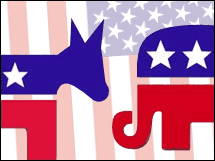Everybody says 'I love you'Politicians love to tout their support for entrepreneurs, especially at election time, but most offer little more than words.(FSB Magazine) -- To judge by the current political rhetoric, our elected leaders are all tireless champions of small business. In July, Senator John Kerry (D-Massachusetts) charged the Bush administration with "balancing the record deficits on the backs of small-business owners." In August, President Bush visited Fox Valley Metal-Tech, a small metal fabricator in Green Bay, Wis., and argued that his tax cuts had helped entrepreneurs. "I'm here to herald small businesses in America," Bush said, "and to remind the American people that by cutting taxes on small businesses, it encourages small businesses to grow."
It's easy to see why politicians cozy up to entrepreneurs. As an emblem of the national spirit, small business ranks right up there with mom, the flag and our troops. Yet most policies advanced in the name of small business do little to help entrepreneurs. More frequently entrepreneurs are used as stage dressing for legislation that is not in their best interests. Elephants Let's start with the Republicans. One favorite conservative rallying cry holds that the estate tax imposes an unfair burden on entrepreneurs and family farmers. In an April speech commemorating Small Business Week, President Bush urged Congress to "get rid of the death tax, for the sake of our small-business owners." But while many entrepreneurs support the proposed abolition - hoping that they will someday be rich enough to fall victim to the tax - in reality the vast majority of small businesses will never be asked to pay it. The Congressional Budget Office reports that only 485 small businesses faced estate tax liability in 2000, the most recent year for which data are available, and today's tax would hit even fewer. Estate tax repeal would mainly benefit a few astronomically wealthy Americans, many of whom are Republican campaign contributors. But that makes for less effective campaign rhetoric. On July 26, Vice President Dick Cheney claimed in a speech that his administration's tax relief had pared $3,600 off the average small-business owner's tax bill in 2005. While entrepreneurs are grateful for any tax relief they receive, that is a highly misleading figure. That "average small business" includes millions of wealthy individuals (including Cheney and President Bush) who derive a portion of their income from consulting or investments in small companies. Most real small-business owners got much less. And the Bush administration financed its tax cuts with borrowed money that must eventually be paid back via benefit cuts or tax increases. According to estimates by the nonpartisan Tax Policy Center in Washington, D.C., more than half of all tax filers with small-business income wind up worse off once the cost of financing the cuts is taken into account. Meanwhile, an increasing number of small businesses get snared every year by the alternative minimum tax (AMT). The AMT was originally aimed at a couple hundred wealthy taxpayers. But the AMT's guidelines have not been adjusted for inflation since 1986, and today an increasing number of middle-income taxpayers - including thousands of small businesses - are forced to pay it. The trend was exacerbated by the 2001 and 2003 tax cuts, which ironically forced even more taxpayers into the AMT by lowering their marginal income tax rates. In speeches President Bush frequently argues that lower income taxes help small-business owners because most entrepreneurs are taxed as individuals. He conveniently fails to mention that the AMT trap negates much of that benefit. Donkeys Most Democrats are no better. As members of a party that has traditionally favored higher taxes, increased regulation and trial lawyers, their efforts to champion entrepreneurship can border on the ridiculous. Democrats routinely trash the Bush administration for slashing the SBA's budget and attempting (unsuccessfully) to eliminate its loan guarantee programs, which purport to create jobs by helping startup businesses get off the ground. But in fact SBA loans benefit a tiny number of politically connected entrepreneurs (less than 1 percent of all businesses), along with the banking industry, which earns billions in loan interest and securitization revenues while allowing taxpayers to shoulder some $70 billion in default risk. By creating an uneven playing field, SBA loans in effect hurt the vast majority of U.S. small businesses that must compete without federal help. Democrats now hope to court Main Street by tackling the health-care crisis, which hurts small businesses disproportionately. But many of their proposed cures are worse than the disease. California Democrats this year proposed a state-administered insurance program paid for by an increase in the payroll tax, already an unfair burden on entrepreneurs and workers alike. (The GOP, meanwhile, backs association health plans, a thinly disguised sop to the insurance industry that would allow insurers to cherry-pick companies with the healthiest employees and deny coverage to the others.) In the end, the wisest opinion may come from someone who belongs to neither party. "Democrats claim to appeal to the little guy and Republicans claim to be the champions of businesses," says Mark Schreiber, an Indiana entrepreneur and former national marketing director for the Libertarian Party. "But neither cares about the little guy with a business." Are you a small business owner whose business has been hurt by recent legislation? Which political party do you think does more for small businesses? Let us know. _______________________ A Hidden Tax on Small Business To write a note to the editor about this article, click here. |
|

